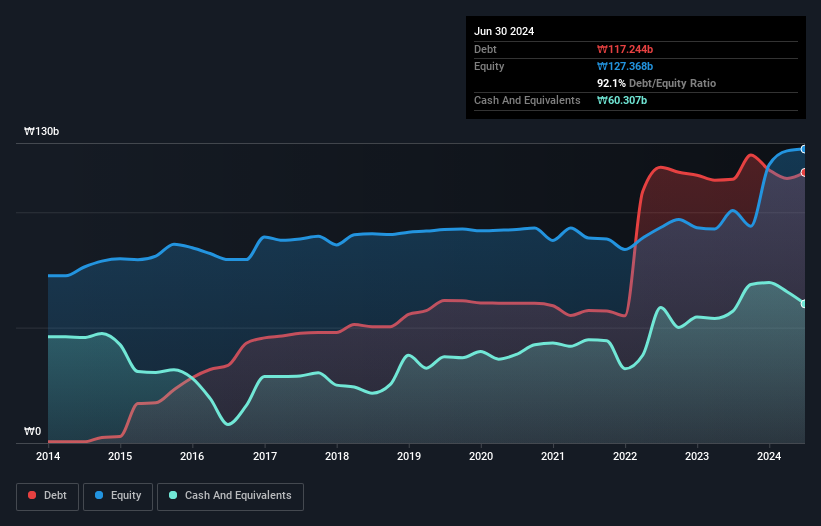Howard Marks put it nicely when he said that, rather than worrying about share price volatility, 'The possibility of permanent loss is the risk I worry about... and every practical investor I know worries about.' It's only natural to consider a company's balance sheet when you examine how risky it is, since debt is often involved when a business collapses. As with many other companies LTC Co.,Ltd (KOSDAQ:170920) makes use of debt. But the more important question is: how much risk is that debt creating?
When Is Debt Dangerous?
Debt and other liabilities become risky for a business when it cannot easily fulfill those obligations, either with free cash flow or by raising capital at an attractive price. In the worst case scenario, a company can go bankrupt if it cannot pay its creditors. However, a more common (but still painful) scenario is that it has to raise new equity capital at a low price, thus permanently diluting shareholders. Of course, plenty of companies use debt to fund growth, without any negative consequences. The first step when considering a company's debt levels is to consider its cash and debt together.
Check out our latest analysis for LTCLtd
How Much Debt Does LTCLtd Carry?
The chart below, which you can click on for greater detail, shows that LTCLtd had ₩117.2b in debt in June 2024; about the same as the year before. On the flip side, it has ₩60.3b in cash leading to net debt of about ₩56.9b.

How Strong Is LTCLtd's Balance Sheet?
The latest balance sheet data shows that LTCLtd had liabilities of ₩182.1b due within a year, and liabilities of ₩6.21b falling due after that. On the other hand, it had cash of ₩60.3b and ₩22.5b worth of receivables due within a year. So it has liabilities totalling ₩105.5b more than its cash and near-term receivables, combined.
When you consider that this deficiency exceeds the company's ₩97.0b market capitalization, you might well be inclined to review the balance sheet intently. In the scenario where the company had to clean up its balance sheet quickly, it seems likely shareholders would suffer extensive dilution. The balance sheet is clearly the area to focus on when you are analysing debt. But it is LTCLtd's earnings that will influence how the balance sheet holds up in the future. So when considering debt, it's definitely worth looking at the earnings trend. Click here for an interactive snapshot.
Over 12 months, LTCLtd made a loss at the EBIT level, and saw its revenue drop to ₩158b, which is a fall of 20%. To be frank that doesn't bode well.
Caveat Emptor
Not only did LTCLtd's revenue slip over the last twelve months, but it also produced negative earnings before interest and tax (EBIT). To be specific the EBIT loss came in at ₩7.1b. When we look at that alongside the significant liabilities, we're not particularly confident about the company. It would need to improve its operations quickly for us to be interested in it. Not least because it had negative free cash flow of ₩28b over the last twelve months. That means it's on the risky side of things. There's no doubt that we learn most about debt from the balance sheet. However, not all investment risk resides within the balance sheet - far from it. Be aware that LTCLtd is showing 3 warning signs in our investment analysis , and 1 of those can't be ignored...
When all is said and done, sometimes its easier to focus on companies that don't even need debt. Readers can access a list of growth stocks with zero net debt 100% free, right now.
New: AI Stock Screener & Alerts
Our new AI Stock Screener scans the market every day to uncover opportunities.
• Dividend Powerhouses (3%+ Yield)
• Undervalued Small Caps with Insider Buying
• High growth Tech and AI Companies
Or build your own from over 50 metrics.
Have feedback on this article? Concerned about the content? Get in touch with us directly. Alternatively, email editorial-team (at) simplywallst.com.
This article by Simply Wall St is general in nature. We provide commentary based on historical data and analyst forecasts only using an unbiased methodology and our articles are not intended to be financial advice. It does not constitute a recommendation to buy or sell any stock, and does not take account of your objectives, or your financial situation. We aim to bring you long-term focused analysis driven by fundamental data. Note that our analysis may not factor in the latest price-sensitive company announcements or qualitative material. Simply Wall St has no position in any stocks mentioned.
About KOSDAQ:A170920
LTCLtd
Provides FPD and semiconductor chemical solutions in Korea and internationally.
Flawless balance sheet with acceptable track record.
Market Insights
Community Narratives



